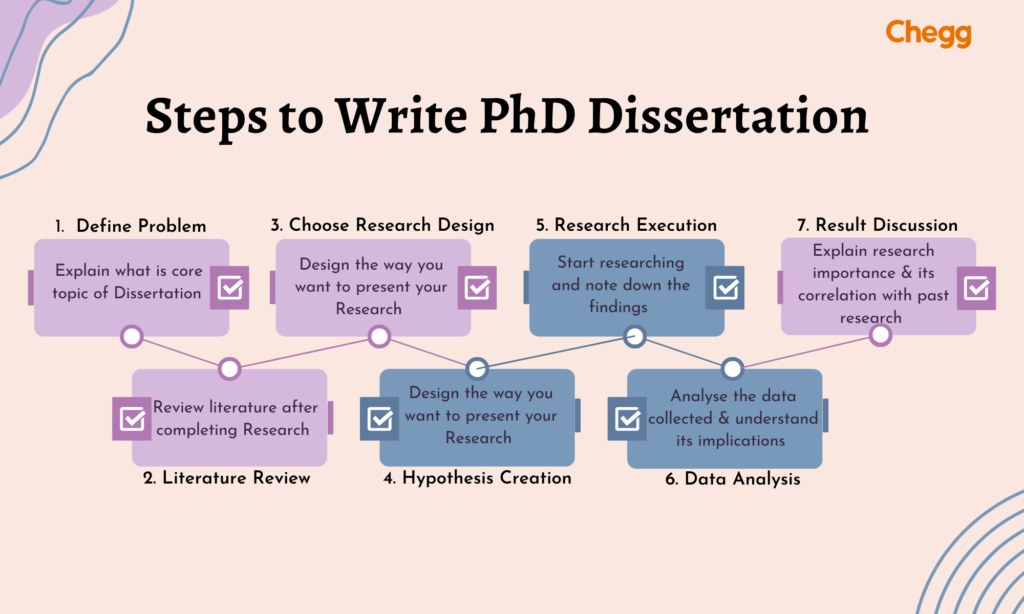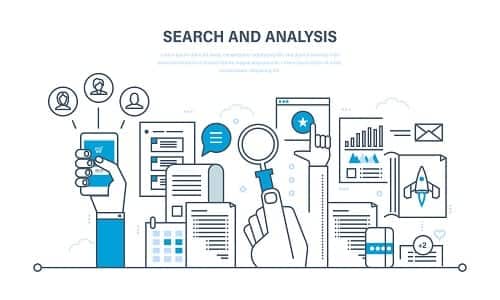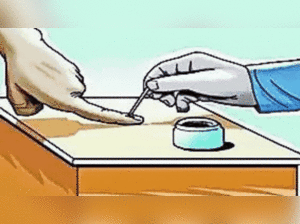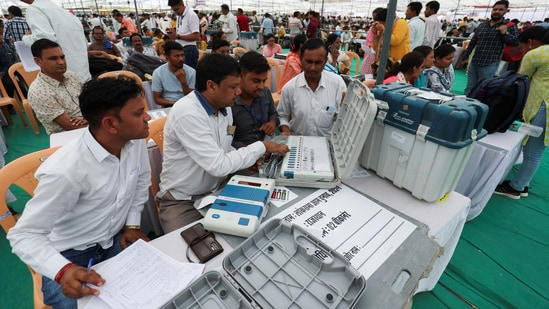Home » Career Guidance » A Comprehensive Guide to Applying for a PhD in India [2024]

A Comprehensive Guide to Applying for a PhD in India [2024]

Quick Summary
- A PhD is a postgraduate research degree in India. It’s the highest academic degree in the country.
- The cost of a PhD course in India differs based on the kind of university people choose. However, if you take estimates, it can cost you around 80k to 2 lacs.
- For admission in PhD in India, students require a Master’s degree in a relevant field. An overall grade point average of at least 55% (or equivalent) is required.
Table of Contents
Did you know that India produces over 20 thousand PhD holders , making it one of the top 5 countries with the most PhD holders?
Sounds great right?
And this number of PhD holders is only going to increase in upcoming years, with the rise in new technologies and scientific research more and more people will pursue a PhD in India.
If you are also thinking about pursuing PhD degree, then read this article till the end to know all about doing PhD in India.

PhD in India- Course Highlights
Reasons to pursue a phd in india.
It is known that the purpose of a PhD is to teach individuals how to conduct research in a field. Candidates learn how to write scholarly papers and present findings, along with gaining skills like critical thinking, problem-solving, and communication. However, there are career-related reasons to choose PhD course, and these reasons are:
- Getting monthly allowances from the government to fund research.
- A PhD student is seen as an expert in their field, thus, making them eligible for job openings related to teaching and research.
- A chance to go to other countries for Academic Exchange Programs and learn various things.
- Getting complete control over what you want to study and how you wish to continue with your research.
- A PhD student gets to interact and work with the best academicians in their field and the professional experts who will guide them during their research.
Types of PhD Courses in India
There are different types of PhD degrees, some are based on distance and some are based on stream. Here is the list of major types of PhD in India.
Common PhD Degrees
Stream-wise phd degrees.

Major PhD in India Entrance Exams
Every university takes its entrance exam for admission and checks the qualification for a PhD of every applicant. However, some entrance exams are conducted on a national level and have more importance. These are the major PhD course entrance exams.
Have a read at a Comprehensive Guide to Entrance Exams after Graduation .
PhD in India- Eligibility Criteria
Getting admission in PhD course is not an easy task, and if you are trying to get admission to any PhD program, check for these PhD eligibility criteria beforehand.
- The candidate must have completed a Master’s degree i.e. (MTech/ MSc/ MA/ MPhil/ MBA). And it must be a full-time Master’s course from a recognised university by the government.
- The overall grade point average of the candidate’s Master’s program must be at least 55% (or equivalent).
- Candidates under SC, ST, and OBC categories will be given 5%- or 10%-mark relaxations. Applicants must present their reservation certificate to use these benefits.
- The candidate must pass the PhD entrance exam.
- A No Objection Certificate (NOC) f rom the educational institution or company where candidates are employed is required. Candidates must have job experience in a related field for a part-time PhD.
PhD Course Structure
1. coursework.
In PhD courses, students take a set have to take core courses or seminars in their field of study to build foundational knowledge. The coursework varies according to university but does includes both required and elective courses.
2. Research proposal
After completing the core courses, students must develop a research proposal outlining the problem they plan to investigate, the research questions they aim to answer, and the methods they will use to collect and analyze data.
3. Comprehensive exams
Before beginning their research for PhD course, students need to pass certain comprehensive exams covering their field of study to demonstrate their competence in the subject matter.
4. Research
Once students have completed their coursework and passed their comprehensive exams, they can begin their research. This typically involves conducting experiments, collecting data, or engaging in other research activities to answer the questions outlined in their research proposal.
5. Dissertation
The final requirement for a PhD course completion is the dissertation, which is a book-length document outlining the student’s research findings, conclusions, and contributions to their field of study. The dissertation has to be defended in front of a committee of faculty members and other experts in the field.
Read more: Complete Guide to Writing a Research Paper

5 Step PhD Course Admission Process
There is Candidates must take the following seven steps to apply for a PhD in India:
Step 1 Find a Mentor
PhD students should find a supervisor willing to support them through their PhD journey. After finding a supervisor, candidates can apply offline or online. Almost all colleges and universities accept online applications now. However, if you wish, you can apply via the offline process by visiting the office of the university.
Step 2 Fill Online Admission Form
Candidates must complete the online PhD admission form before applying on the university or college website. All the needed qualification for PhD is listed on the university’s official website and should be met. The online application is rejected if candidates fail to meet these requirements.
Step 3 Submit Necessary Documents
After completing the online application form, candidates must provide all necessary papers. These documents may include your passing certificate, degree, and migration certificate. Check the list of papers on the website before applying for the PhD admissions.
Step 4 Pass the Entrance Exam
The college/university needs PhD entrance exam. This exam must be taken after completing the application form. Fill out the form for the entrance exam and appear for it.
Step 5 Pass the Interview
Upon passing the PhD entrance exam, candidates will be invited for a doctoral academic interview. Admission is based on the academic doctoral interview and PhD entrance exam results. The institution or college decides the grades of students at each level and after passing the interview and fulfilling some other requirements you get admission.
Top Colleges for PhD in India
Top 10 career options after phd in india.
Source: Ambition Box
Plan Your Career in PhD
Being known as PhD holder is something to be proud of, not just because it’s a symbol of great knowledge but also a great future. If you want a career like this then doing PhD in India is the best choice and if you are confused about how you are going to get admission in PhD, then re-read the article. Do your research, know which specialization you want to choose and excel in your PhD course.
Make sure you carefully explore all your professional options because your career is extremely important. Before making the right decision, look over our career advice.
Frequently Asked Questions
The cost of a PhD course in India differs based on the kind of university people choose. However, if you take estimates, it can cost you around 80k to 2 lacs. This figure can go up or down based on whether you choose a private institute or a government one.
A PhD program lasts for three to five years. Candidates have a maximum of five to six years to finish the program. The course length may be different for different institutes and the time taken by student in completing their thesis.
For admission in PhD in India, students require a Master’s degree in a relevant field. An overall grade point average of at least 55% (or equivalent) is required. In addition to this, candidates must know the language in which the course is taught and evaluated. Now, an MPhil degree is not a must for PhD admissions.
Getting a PhD in India is not easy. Candidates pursuing PhDs in India must pass the entrance exams such as NET. This written exam checks if they have the relevant subject knowledge to conduct advanced research. Candidates must further clear a PhD interview exam. Candidates must clear these rounds before pursuing PhDs in their chosen areas of specialization.
Become an Online Expert
To read more related articles, click here.
Got a question on this topic?
Related Articles
- Privacy Policy
- Chegg Study
- Learn a language
- Writing Support
- Expert Hiring and Payment Dashboard
- पैसे कैसे कमाए? Earn Online
- Career Guidance
- General Knowledge
- Web Stories
Chegg India does not ask for money to offer any opportunity with the company. We request you to be vigilant before sharing your personal and financial information with any third party. Beware of fraudulent activities claiming affiliation with our company and promising monetary rewards or benefits. Chegg India shall not be responsible for any losses resulting from such activities.
- Chegg Inc. Compliance
© 2024 Chegg Inc. All rights reserved.
- Interesting
- Scholarships
- UGC-CARE Journals
Ph.D. in India: Cost, Duration, and Eligibility for Admission
Complete guide to ph.d. in india: duration, costs, eligibility, and recent updates.

Table of contents
How many years is a ph.d. in india, how much does a ph.d. cost in india, what qualifications are required for a ph.d. in india, what is the age limit for a ph.d. in india is 25 too old to start a ph.d., can i do a ph.d. without the national eligibility test (net), who is eligible for direct ph.d. admission, is it okay to do a ph.d. without a master’s degree, what are the recent rules for ph.d. admissions in india, 25 tips to join phd in india, 10 steps to join ph.d. in india.
Embarking on a Ph.D. journey in India is a significant academic and professional pursuit. Aspiring research scholars often have questions regarding the duration of a Ph.D., the associated costs, eligibility criteria, and recent developments in the field. In this comprehensive guide, ilovephd aims to address these queries and shed light on the essentials of pursuing a Ph.D. in India.
A Ph.D. program in India typically takes around 3 to 5 years to complete, depending on various factors such as the discipline, research area, individual progress, and university regulations.
The duration may vary, but it is important to be prepared for a substantial commitment of time and effort.
The cost of pursuing a Ph.D. in India varies across institutions. Generally, public universities offer Ph.D. programs with minimal or subsidized tuition fees. Private universities may have higher fees.
It’s advisable to explore funding options such as scholarships, fellowships, or research grants provided by government bodies, funding agencies , or individual institutions to support your Ph.D. journey.
To pursue a Ph.D. in India, a candidate typically needs a postgraduate degree (Master’s or equivalent) in a relevant field. It is important to note that specific eligibility criteria may vary between universities and disciplines.
Additionally, universities often require candidates to clear entrance exams or interviews and meet minimum academic standards to be considered for admission.
In most cases, there is no strict age limit for pursuing a Ph.D. in India. As long as you meet the eligibility criteria and demonstrate the necessary academic qualifications, you can pursue a Ph.D. at any age.
Therefore, 25 is certainly not too old to start a Ph.D. Many scholars begin their doctoral studies later in life, bringing valuable experiences and perspectives to their research.
While the National Eligibility Test (NET) is a common requirement for lectureships and research fellowships in India , it is not mandatory for all Ph.D. programs. Some universities may have their own entrance exams or selection processes.
It is important to check the specific requirements of the university or institution where you plan to pursue your Ph.D.
Direct Ph.D. admission is a pathway for exceptional candidates who have completed their undergraduate studies and wish to pursue a Ph.D. without a Master’s degree.
However, this option is typically available to a limited number of candidates, and universities may have specific criteria and guidelines for direct Ph.D. admissions. It is advisable to consult with individual institutions to understand their policies regarding direct Ph.D. admissions.
While a Master’s degree is generally the standard qualification for pursuing a Ph.D., some universities in India offer integrated Ph.D. programs that allow students to directly enter the Ph.D. track after completing their undergraduate studies.
However, this option may be limited to certain disciplines or institutions. It’s important to research and identify institutions that offer such programs if you wish to pursue a Ph.D. without a Master’s degree.
The rules and regulations for Ph.D. admissions in India are subject to change and can vary between universities and disciplines.
It is advisable to stay updated with the guidelines provided by individual universities and regulatory bodies such as the University Grants Commission (UGC) or the All India Council for Technical Education (AICTE) to ensure compliance with the latest requirements.
25 tips to help you join a Ph.D. program in India:
- Research your field of interest thoroughly to identify potential research areas and topics.
- Explore various universities and research institutes in India that offer Ph.D. programs in your chosen field.
- Check the eligibility criteria and admission requirements of each institution you are interested in.
- Take note of application deadlines and ensure you submit your application well in advance.
- Prepare a strong statement of purpose (SOP) that highlights your research interests, goals, and why you are interested in pursuing a Ph.D.
- Contact potential supervisors or faculty members whose research aligns with your interests to discuss your research proposal.
- Prepare for entrance exams that may be required for admission, such as the UGC-NET, GATE, or university-specific entrance exams.
- Enhance your academic profile by participating in research projects, publishing papers, or presenting at conferences.
- Build a strong recommendation letter portfolio by reaching out to professors or mentors who can attest to your academic abilities and research potential.
- Seek out scholarships, fellowships, or research grants offered by government bodies, universities, or funding agencies to fund your Ph.D.
- Familiarize yourself with the research facilities, laboratories, and resources available at the institutions you are considering.
- Attend research seminars, workshops, and conferences related to your field to stay updated with the latest developments and network with researchers.
- Develop good communication and writing skills, as they are essential for presenting research findings and publishing papers.
- Create a well-structured and feasible research proposal that clearly outlines your research objectives, methodology, and expected outcomes.
- Be prepared for interviews or presentations as part of the selection process, where you may need to defend your research proposal or discuss your academic background.
- Gain teaching experience by assisting professors or taking up teaching assignments to enhance your profile for future academic positions.
- Connect with current Ph.D. students or alumni of the institutions you are interested in to gain insights into the program and research environment.
- Stay updated with any changes in the rules, regulations, or policies related to Ph.D. admissions in India.
- Develop a strong work ethic and time management skills, as Ph.D. programs require dedication, self-discipline, and long hours of research.
- Consider the location and infrastructure of the institution, ensuring it suits your research needs and provides a conducive environment for learning.
- Explore interdisciplinary opportunities and collaborations to broaden your research scope and gain different perspectives.
- Discuss funding options and financial support with the institutions you are applying to, and be prepared to seek external funding if necessary.
- Keep track of your research progress and maintain regular communication with your supervisor or mentor.
- Attend preparatory courses or workshops on research methodology or academic writing to enhance your research skills.
- Finally, be passionate, persistent, and proactive in pursuing your Ph.D. dream. Embrace the challenges, stay motivated, and enjoy the journey of knowledge creation.
Remember, each institution may have its own specific requirements and procedures, so it’s crucial to carefully review their official websites or contact the admissions offices for accurate and up-to-date information.
Here are 10 steps to join a Ph.D. program in India:
- Research your field: Explore different research areas and identify your specific field of interest for pursuing a Ph.D. in India.
- Shortlist institutions: Identify universities or research institutes in India that offer Ph.D. programs in your chosen field.
- Review eligibility criteria : Check the eligibility requirements of the institutions you are interested in, including minimum educational qualifications and entrance exam scores.
- Prepare application documents: Gather the necessary documents, such as academic transcripts, recommendation letters, statement of purpose (SOP), and research proposal.
- Prepare for entrance exams: If required, prepare for entrance exams like UGC-NET, GATE, or university-specific exams. Familiarize yourself with the syllabus and exam pattern.
- Apply to institutions: Submit your applications to the shortlisted institutions within the specified deadlines. Pay attention to the required application fees and submission procedures.
- Attend interviews (if applicable): Some institutions may conduct interviews or presentations to assess your research aptitude and fit for the program. Prepare well for these interactions.
- Secure funding: Explore funding opportunities such as scholarships, fellowships, or research grants. Check if the institutions offer any financial support or external funding options.
- Accept an offer : Once you receive acceptance letters from the institutions you applied to, carefully evaluate and select the most suitable offer based on research facilities, faculty expertise, funding, and overall fit.
- Complete admission formalities: After accepting an offer, complete the necessary admission formalities as specified by the institution. This may include submitting additional documents, paying fees, and fulfilling any other requirements.
It’s important to note that the specific steps and procedures may vary between institutions. Therefore, always refer to the official websites and admission guidelines of the institutions you are applying to for accurate and up-to-date information.
Pursuing a Ph.D. in India is a rewarding and intellectually stimulating endeavor. Understanding the duration, costs, eligibility criteria, and recent developments is crucial to navigating the process effectively.
By considering these factors and conducting thorough research, aspiring Ph.D. scholars can embark on their academic journey with confidence and clarity.
Remember to reach out to universities or institutions directly for specific information and seek guidance from mentors or faculty members who can provide valuable insights into the Ph.D. application process in your chosen field. Good luck with your Ph.D. pursuit!
Also Read: Best 100 Institutions to Study PhD in India – 2023
- doctoral studies
- Ph.D. admission
- Ph.D. costs
- Ph.D. duration
- Ph.D. eligibility
- Ph.D. in India
- Ph.D. programs
- Ph.D. updates
- PhD Admission
- PhD Admissions in India
- PhD in India
- pursuing Ph.D.
- research scholars in India
UGC-CARE List of Journals – Arts and Humanities – 2024
Choosing a phd supervisor 9 key factors to consider, top 45 qs world rankings for indian universities – 2024, email subscription.

iLovePhD is a research education website to know updated research-related information. It helps researchers to find top journals for publishing research articles and get an easy manual for research tools. The main aim of this website is to help Ph.D. scholars who are working in various domains to get more valuable ideas to carry out their research. Learn the current groundbreaking research activities around the world, love the process of getting a Ph.D.
WhatsApp Channel
Join iLovePhD WhatsApp Channel Now!
Contact us: [email protected]
Copyright © 2019-2024 - iLovePhD
- Artificial intelligence
Ph.D. process in India, step-by-step guide

PhD Process in India
How to get Ph.D. in India
Deciding to pursue a Ph.D. is a big step, and applying can feel long. To make you understand the Ph.D. process in India, we have put together a simple step-by-step guide to the Ph.D. application process. Applying for a Ph.D. has never been easier, with essential tips and links to more information.
Understanding PhD
The Ph.D. is an academically focused doctoral degree. Ph.D. programs typically last three years, and candidates must complete the course within a maximum of five to six years. However, the course duration may vary as per the institution’s protocols. Applicants must hold a master’s Degree to get admission to the doctoral program.
Candidates can complete the Ph.D. program in any stream. Ph.D. programs require applicants to choose a topic or subject, research it thoroughly, and answer all questions related to the topic/subject.
Candidates who pass entrance examinations such as UGC NET, GATE, JEST, and others, usually get scholarships while pursuing their doctoral studies. Besides this, universities like IGNOU and the University of Delhi (DU) also offer scholarships for students to pursue a full-time Ph.D.
Ph.D. courses in India
Some of the Ph.D. courses offered in India are:
- Soil science and agriculture chemistry
- Physical Chemistry
- Remote Sensing
- Geoinformatics
- Medical Physics
- Paramedical
- Physiotherapy
Engineering
- Information technology
- Computer Engineering
- Electronics Engineering
The Eligibility to do Ph.D. in India
- Master’s diploma holders are eligible for admission to doctoral packages. For a few topics, a Master’s in Philosophy is necessary for pursuing a Ph.D.
- The college students must have a minimum of 50-55% of post-graduation marks.
- In a few universities, admission is obtainable based on interviews. You can supplement it with a written exam.
- More choice is given to applicants who have paintings revealed within the discipline of studies.
One-year Ph.D. programs in India
Now save your gap years and get a Doctor of Philosophy (Ph.D.) Degree in One Year via speedy mode in India. Now students can save their time of two or three Years who have discontinued their studies until twelfth Graduation. Candidates can complete their Doctor of Philosophy (Ph.D.) in One Year via One sitting Degree. A without delay enrolled scholar can have a Doctor of Philosophy (Ph.D.) Degree after a success crowning glory of the direction. After this, a candidate can get roles in any authority besides the private sector.
Value of Ph.D. in India
Ph.D. gives many task possibilities in India in private and non-private sectors. Candidates have more than one possibility to discover. Most Ph.D. applicants go for lectureships or in studies and improvement facilities, litigation, scientific studies, and many more.
Ph.D. fees in India
Often, the Doctor of Philosophy (Ph.D.) Course Fees fluctuate from one university to the other. Some college charges are higher than the scholars, and a few are much less according to the government norms. However, applicants must observe the university’s price guidelines during counseling—common Ph.D. Course Fees vary from Rs. 4000 to Rs. 14, 00,000 primarily based on the chosen university and specialization. Moreover, the colleges offer unreserved seats for the applicants by maintaining a separate price shape that ranges from Rs 20,000 to 30,000 for 12 months.
Ph.D. subject list
The Ph.D. Course syllabus depends on the specialization that a student chooses to focus on. The subjects get categorized into core and elective subjects. Core subjects help the students to learn how to conduct productive and ethical research. Electives are the optionally available topics that scholars pick out primarily based on their specialization.
- Core Subjects:
- Research Methodology
- Ethics of Research
- Literature Review
- Ethics of Using Social Media in Research
- Research Tools
- Proposing a Research
- Formulation of Research Proposal
The preferred syllabus of a Ph.D. is that, initially, college students uncover the distinct way of engaging in studies and learning a way to do the right thing. Then in the next step with their specialization from the third semester, the Ph.D. topics listing begins to fluctuate.
How to select the subject for Ph.D. thesis writing?
Choose a subject to maintain your interest. Determine what assets you have available, such as time, money, and people, and pick out a topic that is only sometimes resource-intensive.
- Read a lot about your chosen subject
To write well, you must first read a lot more than that. Find a theoretical foundation to help your subject matter. Do a few studies to discover theories that match your subject perfectly. Ideally, know the format of the report and the thesis before you begin writing.
- Look for a gap wherein you may make a difference.
Be positive when you are genuinely providing something new to the discipline. You cannot alternate the sector with one dissertation, so recognition is at the crux of what you need to discover and upload something new to the discipline.
- Let yourself shift gears.
The subject you begin with frequently derives from your unique plan because it evolves. So, do not be afraid of shifting.
How can editing and proofreading service providers assist in getting your Ph.D. done?
Writing a dissertation takes a lot of effort and time. When someone puts a lot of effort and time into something, it is natural to want the final version to be bug-free. Putting all the commas and colons in the right place can be even more of a headache, so it is best to turn to an online dissertation editing service .
We value your time and understand the seriousness of final editing and proofreading before submitting your manuscript. You do not want to get a bad grade just because your sentence patterns, spelling, or grammar do not meet the requirements. An editing service will assist your entire process of writing a thesis, from selecting the topic and writing the proper format to submit a bug-free report.
Final Verdict
Graduating with a Ph.D. is a big career decision, so take calculated steps. This blog will help you to explore easy ways to get Ph.D. in India . We wish you luck!
Contact us for thesis proofreading and editing services as well as PhD consultation and assistance.
- connect with us
- 1800-572-9877
- [email protected]
- We’re on your favourite socials!

Frequently Search
Couldn’t find the answer? Post your query here
- Science Exams
- UGC NET Exam
- UGC NET News & Updates
- PhD Admission in India 2024: Dates, Eligibility, Entrance Exams, Admission Process, Top Colleges
Updated On: April 19, 2024 02:33 pm IST | UGC NET
PhD is the next step in the academic journey for students who are passionate about research. If you are considering PhD studies in India, then check out this article on PhD admission 2024 that talks about the admission process, entrance exam schedule and important dates for PhD admission!
PhD Admission 2024: Latest Updates
Application deadline for phd admission 2024 in top colleges, eligibility criteria for phd admission 2024, admission process for phd admission 2024, entrance exams required for phd admission 2024, top entrance exams schedule for phd admission 2024, top universities in india for phd admission 2024, preparation tips for phd admission, job prospects after phd in india.

PhD Admission in India 2024: PhD admission in India is determined by entrance exams such as the UGC, CSIR NET, IIT JAM, etc. Some universities also offer PhD admissions based on merit, followed by an in-person interview. For PhD admission at prestigious central universities like JNU, DU, etc., the National Test Agency (NTA) conducts the UGC NET entrance exam . UGC NET scores are accepted by most of the universities in India that offer PhD courses. To be eligible for PhD admission 2024 at top PhD colleges in India , applicants must have secured a minimum of 50% aggregate marks or equivalent CGPA in their postgraduate degree. As a part of the PhD admission eligibility, a valid cut-off score in an entrance exam is also required.
Doctor of Philosophy or PhD course is the highest degree or doctorate awarded for research in a specific subject, lasting three to five years. It involves substantial research work and presentation of the thesis, which is to be accredited by fellow academicians. Candidates interested in PhD admission 2024 in India are required to give presentations on their research work, submit their progress reports, and defend their thesis in an open defence viva voice. In this article, we will discuss everything you need to know about PhD course eligibility, the admission process, top colleges and universities, popular entrance exams, and more.
All PhD admissions for the academic year 2024 have been completed. Here is a list of important dates and events that occurred for your convenience. Here are the latest updates on PhD admission 2024:
- The entrance exam for the RGUHS PhD programme is scheduled for April 19 and 20, 2024.
- VIT Vellore PhD admission is now accepting applications through April 25, 2024, based on VITREE.
- By July 29, 2024, register for the PhD programme at ICFAI Jaipur.
The table below includes the top PhD colleges and their application dates for PhD admission 2024:
Students who intend to pursue PhD in India must meet the necessary PhD admission eligibility criteria required by their respective colleges. Listed below are the detailed PhD qualifications required for pursuing a PhD from India:
- Masters degree holders are eligible for PhD admission 2024 into the doctoral programme. Although, for some subjects, having a Master in Philosophy (MPhil) is one of the criteria for PhD admission eligibility. It must be noted by the candidates that in some Indian universities, for a Master's programme, a specific percentage (or equivalent CGPA) is required to satisfy a PhD course eligibility requirement.
- For admission into some reputable universities, a candidate must qualify for the all-India examination, like the National Eligibility Test for Lectureship (NET) conducted by NTA. Final-year students appearing in the qualifying degree examination can also apply although they must submit the attested copies of their qualifying degree certificates
- Admission is offered based on interview. Also, the interview may be supplemented with a written exam if needed.
- Candidates should have a valid Graduate Aptitude Test in Engineering (GATE) score to satisfy a PhD admission eligibility criteria in the field of engineering and technology. Also, candidates should have completed their degree in Masters of Technology (MTech / Masters in Engineering (ME) in any engineering branch to satisfy the PhD course eligibility in engineering.
The need for a PhD degree in India has increased in recent times because of the increasing career prospects and the growing requirement for higher specialisation. Applicants who want a PhD admission 2024 must consider the following points concerning the admission procedure as the admission is done based on merit and/or entrance exams.
- Admission into colleges/ universities in India is available for candidates in full-time and part-time programmes in various disciplines of engineering, arts, management, commerce, science, humanities, finance, law, medicine and IT.
- Candidates can choose to pursue their PhD either full-time or part-time. The minimum duration of PhD is two years wherein the course follows the semester system including theory and practical versions on the specialisation of a respective course.
- For PhD admission 2024, a Master's degree is required in India. Some universities in India offer seats to students having a minimum of 55% aggregate marks or equivalent.
- In some cases, doing an MPhil is a part of their PhD admission criteria to pursue courses offered by some universities.
- Admissions to a PhD programme is done through an entrance test at the university level or national level.
The admission procedure for both processes is described below.
The entrance exams for PhD courses conducted in India may vary university-wise. PhD admission in India is based on enrollment to several universities. Universities accept the results of either a national-level or a university-level entrance examination. The following section summarises the PhD admission 2024 entrance exam schedule. Mentioned below is the list of the top entrance exams for PhD in India:
As discussed, PhD admission 2024 is primarily based on entrance exams. Applicants can select from several PhD specialisations, including mathematics, engineering, education, and engineering. The table below shows the exam schedules for India's most competitive PhD entrance exams.
For PhD admissions, the majority of the universities/institutes conduct their entrance examinations and also consider the GATE/ NET scores. Here is a list of some of the popular universities in India offering PhD courses to the candidates:
Here are some preparation tips for PhD entrance exams which students can use for reference:
- Students should gather past year PhD entrance exam question papers from reliable sources and study accordingly.
- They must refer to the PhD entrance exam syllabus as per their specialisation.
- The entrance exam format varies depending on the conducting body; therefore, the aspirants must be informed of the structure to plan accordingly.
- They must cover all exam subjects at least one month before the exam.
- To relieve exam stress, the students must take advantage of the various mock tests available.
- Keeping up with current events is vital because they are essential for grades.
- Visiting the exam centre a day before the exam to avoid last-minute confusion about where the exam centre location is advised.
- Before the exam, students must get a good night's sleep.
In today’s world, there is immense scope for candidates after they have completed their PhD. Gone are those days when the scope of PhD was limited to academia. After completing a PhD, one should track their potential and apply to jobs based on exact skills and expertise. Following are a few career options that candidates can choose after pursuing a PhD:
- Lecturer & Professor
- Author & Writer
- Editor & Critic
- Human Services/ Social Worker
- Independent Consultant
- Philosophical Journalist
- Industrial R&D Lab professionals
- Senior Research Scientist
PhD is considered one of the most valued degrees not just in India but abroad as well. When it comes to your career graph, it can be a good qualification for the aspirants. Many colleges or universities offer this course for aspiring students, however, one should satisfy their respective PhD admission eligibility. With this, candidates will have in-depth knowledge and develop mastery over the subjects they have chosen for specialisation, which will be extremely useful for them in their careers.
Stay tuned to CollegeDekho for more such updates and information. Aspirants can also check out our QnA Zone to get their queries resolved by our experts. We wish good luck to all the candidates seeking PhD admission 2024 in India!
Are you feeling lost and unsure about what career path to take after completing 12th standard?
Say goodbye to confusion and hello to a bright future!
A PhD is an abbreviation for Doctor of Philosophy, which is the highest academic course level. The breadth of knowledge that a PhD bestows on its holders allows them to excel in research, analysis, and critical thinking to an extent that bachelor's or master's degrees cannot match.
A doctorate or PhD degree typically takes three years to complete. Candidates accepted into the programme have a maximum of 5 to 6 years to complete their research. However, the duration of the PhD programmes varies by institute.
A PhD programme allows you to specialise in a variety of fields. Chemistry Clinical Psychology Education Physics Electronics and Communications Engineering Educational Leadership and Administration are some of the popular doctorate level courses.
Whether a PhD is required after a master's degree depends on a candidate’s interests in a particular specialisation. To be eligible to enrol in a PhD programme, candidates must hold a master's degree in good standing. A PhD course can be pursued by students in any field.
A PhD is the highest educational qualification that can be obtained. A PhD candidate can expect to earn PhD salary between INR 6 and INR 12 lakhs per year.
The list of the top 10 easiest PhDs to obtain includes a PhD in Humanities, a PhD in Education, a PhD in Theology, a PhD in Business Administration, a PhD in Psychology, a PhD in Literature, a PhD in Criminal Justice, a PhD in Public Policy, a PhD in History, and a PhD in Sociology.
Yes. It is every so often possible to forego your master's programme and enrol directly in doctoral courses. You can choose to forego your PG degree by enrolling in a research programme after earning your bachelor's degree.
Yes, students can finish their PhD in two years. While a small percentage of exceptionally talented candidates can finish their PhDs in under 12 months, most applicants finish theirs in two years. The rarity and impressiveness of this cannot be overstated, but it is always possible. The secret to completing a PhD promptly is to have a solid academic background before you begin.
In most cases, a two-year Master's OR MPhil degree in the relevant field from any accredited Indian or foreign university is the minimal requirement for admission to a PhD programme. She or he must have earned a master's degree or a grade equivalent with at least 55%.
Was this article helpful?
Be the first to know.
Get Access to Latest Updates
Do you have a question? Ask us.
Typical response between 24-48 hours
Get personalized response
Free of Cost
Access to community
Similar Articles
- CUET 2024 City Intimation Slip (April 30): Release Date and Time, Download Link, List of Exam Cities
- List of Universities Accepting CUET 2024 Score
- Kerala University BSc Admission 2024 - Dates, Eligibility, Application Form, Selection Process
- LNMU Part 1 Online Admission 2024: Dates, Eligibility Criteria, Application Process, Admission
- Kerala University UG Admission 2024: Dates, Eligibility, Application Process, Allotment, Colleges
- Bihar BSc Agriculture Admission 2024: Dates, Entrance Exams, Eligibility, Application Process, Counselling Process and Top Colleges
Recent Articles
- IIT JAM 2024 Cutoff for IIT Bhilai: Check Opening and Closing Ranks for IIT Bhilai M.Sc Admission 2024
- IIT JAM 2024 Cutoff for IIT Bhubaneswar: Check Opening and Closing Ranks for IIT Bhubaneswar MSc Admission
- IIT JAM Cutoff 2024 for IIT (BHU) Varanasi: Check Opening and Closing Ranks for IIT Varanasi MSc Admission
- IIT JAM 2024 Cutoff for IIT Delhi: Check Cutoff for IIT Delhi MSc Admission 2024
- IIT JAM Biotechnology (BT) Cutoff 2024: Check Year & Category-Wise Minimum Qualifying Marks
- IIT JAM 2024 Mathematics (MA) Cutoff: Check Year & Category- Wise Minimum Qualifying Marks
- IIT JAM Chemistry Cutoff 2024: Check Year & Category-Wise Qualifying Cutoff Here
- IIT JAM Physics Cutoff 2024: Check Year & Category-Wise Qualifying Minimum Marks
- IIT JAM Mathematical Statistics Cutoff 2024: Check Year & Category-Wise Minimum Qualifying Marks
- IIT JAM Economics Cutoff 2024: Check Year & Category-Wise Minimum Qualifying Marks
- IIT JAM Geology Cutoff 2024: Check Year & Category-Wise Minimum Qualifying Marks
- IIT JAM 2024 Cutoff for IIT Madras: Check Opening and Closing Ranks for IIT Madras MSc Admission
- IIT JAM 2024 Cutoff for IIT Mandi: Check Opening and Closing Ranks for IIT Mandi MSc Admission
- IIT JAM 2024 Cutoff for IIT Jammu: Check Opening and Closing Ranks for IIT Jammu MSc Admission
- IIT JAM 2024 Cutoff for IIT Bombay: Check Opening and Closing Ranks for IIT Bombay MSc Admission
- IIT JAM 2024 Cutoff for IIT Patna: Check Opening and Closing Ranks for IIT Patna MSc Admission
- IIT JAM Cutoff 2024 for IIT Kanpur: Check Opening and Closing Ranks for IIT Kanpur MSc Admission
- IIT JAM Cutoff 2024 for IIT Hyderabad: Check Opening and Closing Ranks for IIT Hyderabad MSc Admission
- MG University UG Admission 2024: Dates, Courses, Eligibility, Application Process, Allotment
- Lucknow University UG Admission 2024: Dates (Out), Eligibility Criteria, Admission, Counselling Process
- Lucknow University BSc Admission 2024 - Dates, Application Form, Eligibility Criteria, Admission Process, Reservation Policy
- Calicut University UG Admission 2024: Dates, Eligibility, Admission and Selection Process
- Lucknow University PG Admission 2024- Dates (Out), Application Form, Eligibility, Counselling Process
Recent News
- APRJC Hall Ticket (Released) Download 2024
- GAT B Admit Card 2024 Released: Download link activated, important instructions
- APRJC Hall Ticket Expected Release Time 2024
- GAT B Admit Card Release Date and Time 2024
- CUET PG Result Link 2024 Activated: NTA releases result, list of top universities
- IIT JAM Admission Form 2024 Released: Register now for IIT M.Sc admission
- AP RCET Hall Ticket 2024 Download Link Activated
- AP RCET 2023-24 Hall Ticket Releasing Today: Check subject-wise exam schedule
- AP RCET Hall Ticket 2023-24 Release Time
- APRJC Hall Ticket Release Date 2024: Know when hall ticket download begins
- CUET PG Result 2024 likely to be released by last week of April
- CUET UG 2024 Application Form Correction Closing Today: List of details allowed to correct
- CUET PG Response Sheet 2024 Live Updates: Answer key download link, pgcuet.samarth.ac.in
- AP RCET Application Form Correction 2024 Begins: List of details allowed to edit
- CUET PG 2024 Responses with Key Releasing Today: Steps to file objections
- GAT-B 2024: Top participating institutes, scholarships
- IIT JAM CCMN Counselling Expected Start Date 2024
- IIT JAM 2024: Admission form to be released on April 10, important details
- NEST Application Form 2024 Released at nestexam.in, list of courses
- IIT JAM Scorecard 2024 Released: Counselling registration to begin on April 10
- IISER AT Application Form 2024 Released: Registration link activated, important instructions
- AP PGCET Application Form 2024 Released; Registration link activated, important dates
- CUET PG 2024 Response Sheet Expected Release Time
- CUET UG 2024 Form Correction Dates Revised: Registration last date extended
- NEST 2024 Registration Begins Today: Check eligibility criteria and fees
- UGC NET June 2024 Registration likely from April first week: UGC Chairman
- CUET PG Response Sheet 2024 to be released on April 4 at pgcuet.samarth.ac.in
- NEST 2024 Application Form Revised Release Date Out: Registration to begin on March 30
- CUET UG 2024 Registration Last Date Extended: Check revised dates to fill application form
- CUET UG Application Form 2024 Closing Today: Know when form correction begins
Trending Now

Subscribe to CollegeDekho News
Top 10 science colleges in india.
- Approved by: Other
- Type: Private
- Download Brochure
- Approved by: NAAC
- Type: University
- Approved by: University of Delhi, NAAC
- Approved by: UGC, NAAC, AICTE
- Type: Private UnAided
- Approved by: UGC, NAAC
- Type: Private Aided
- Type: Local Body
- Get Free Counselling
- Approved by: Other, AICTE
Popular Degrees
- B.Sc. (Bachelor of Science)
- M.Sc. (Master of Science)
- B.Sc. + M.Sc.
CollegeDekho's expert counsellors can help you with all your doubts
- Enter a Valid Name
- Enter a Valid Mobile
- Enter a Valid Email
- By proceeding ahead you expressly agree to the CollegeDekho terms of use and privacy policy
Details Saved

Your College Admissions journey has just begun !
Try our AI-powered College Finder. Feed in your preferences, let the AI match them against millions of data points & voila! you get what you are looking for, saving you hours of research & also earn rewards
For every question answered, you get a REWARD POINT that can be used as a DISCOUNT in your CAF fee. Isn’t that great?
1 Reward Point = 1 Rupee
Basis your Preference we have build your recommendation.

How to Apply for PhD in India
“Education is the key to unlocking the world, a passport to freedom” -Oprah Winfrey
- Study Aboard

PhD (Doctor of Philosophy) in India–In recent times, pursuing a PhD has become a new normal for many students in India. Every year, thousands of students obtain their PhD degrees and move on to land lucrative job profiles with a handsome salary in their career. PhD is a doctorate academic degree that offers students the highest academic qualification in their field of study. It is a distinct research-based course that is pursued after completing a master’s degree (MA/ MCom/ MSc/ MBA/ MPhil/ PGDM/ PGPM).
How to Enroll for PhD in India
As more and more universities/ colleges in India are granting PhD degrees, the number of applicants has also increased. It requires a good deal of commitment, but with the correct information and proper guidance, you will easily be able to secure your seat for PhD and obtain your degree. You can pursue your PhD in various fields/specializations, but it needs to be related to the discipline that you did your Master's degree. The duration of pursuing a PhD ranges from 3 years to 5 years, and it can be studied in two formats – either a full-time PhD or a part-time PhD.
The duration depends on your academic rigor and the format of PhD that you have opted for. Generally, the duration of a full-time PhD is three years, where the candidate spends his/ her entire time studying on campus. On the other hand, a part-time PhD is pursued by candidates who wish to work while doing their research.
While you pursue your PhD, you will have to carry out individual & unique research in your field/specialization. Your PhD will revolve around your research, and during the course, you will also have to document your research into a research thesis. The research thesis is submitted to your university/ college at the end of the course, and you have to defend it in an "open defense academic viva-voce". In every specialization, there are various research topics to choose from based on your interest. You can even develop new methods and techniques while conducting your research.
Why Should You Pursue PhD in India?
The advantages associated with pursuing a PhD in India are mentioned below:
- Pursing a PhD will help you to gain academic excellence and an edge over others who don't hold a PhD.
- PhD is one of the most valuable academic degrees in India as well as abroad. It is one of the best qualifications that an individual can obtain academically.
- Along with academic excellence, you will be allowed to use the 'Dr' prefix before your name after you have obtained your PhD. This is a highly respected matter, especially in India.
- You will gain immense research & development experience in your specialization during the research.
- You will be exposed to holistic learning through theoretical methods, practical approaches, and research & development orientation during the course.
- Many government organizations hire candidates who hold a Ph.D., especially consultants and advisors.
- You will be able to obtain in-depth knowledge & skills of your specialization. After the course completion, you will develop mastery over your specialization.
- During your research, you can collaborate/ work with some of the best academicians in the field as well as professional experts.
Top Universities/ Colleges in India for Pursuing PhD

- Indian Institute of Science (IISc, Bangalore).
- Jawaharlal Nehru University (JNU, New Delhi).
- Banaras Hindu University (BHU, Varanasi).
- University of Delhi (DU, Delhi).
- University of Calcutta (CU, Kolkata).
- Manipal Academy of Higher Education (MAHE, Manipal).
- Anna University, Chennai.
- Birla Institute of Technology & Science (BITS, Pilani).
- Indian Institute of Technology (IIT).
- Indian Institute of Management (IIM).
- Indian Institutes of Information Technology (IIIT).
For every type of university, there is a difference in fees and eligibility criteria. Anyway, as mentioned above, if your research is good, the university/ college will hardly matter. In simple words, the value of your PhD depends on your research and not the type of university you are pursuing it from.
- Holding a full-time bachelor's degree is a must for candidates who wish to apply for a PhD in India.
- The candidate must have secured his/ her Master's degree (MSc/ MTech/ MPhil/ MA/ MBA) by pursuing a full-time master's course from a government-recognized university. Correspondence master's degrees are generally not allowed for PhD admissions.
- In his/ her Master's degree, the candidate should have scored at least 55% marks overall (or equivalent grade point).
- In case the candidate hails from a reserved category household (SC/ ST/ OBC), he/ she will be offered relaxation in minimum marks of either 5% or 10%, depending on the college or university. In this circumstance, the candidate has to furnish his/ her reservation certificate while applying.
- University/ College mandated PhD entrance examination needs to be cleared by the candidate to ensure a seat for pursuing a PhD.
- If a candidate wishes to pursue a part-time PhD, In that case, he/ she will have to furnish a NOC (No Objection Certificate) obtained from the educational institute or organization he/ she is currently employed.
- For admission to some of the universities/ colleges in India for a PhD, candidates need to have mandated work experience in a relevant field.
Things to Keep in Mind before Applying for PhD in India
Mentioned below are a few points that you need to decide before applying for admission to any university/ college in India to obtain a PhD:
- Decide the Colleges/ Universities that you want to apply for – As mentioned above, several universities/ colleges in India offer a PhD. It would be best to narrow it down before using it to ensure you don't get tangled with various entrance exams and admission processes.
- Think of a specialization and research proposal – You may be required to submit your research proposal during the admission process, or you may be asked about your research proposal during the academic interview. To tackle both these situations, make sure that you have thought about a research proposal beforehand.
- Prepare for the Ph.D. entrance exams – Ph.D. entrance exams are slightly competitive, especially UGC NET & UGC JRF. Before appearing for the entrance tests, you need to make sure that you have done your homework.
- Mode of PhD (full-time or part-time) – You also have to make sure about the mode of PhD you want to pursue, i.e., either the full-time format or the part-time format. For a part-time PhD, you need to be a full-time employee of an organization/ university/ college before applying.
After you have thought about the points mentioned above, you can follow the steps mentioned below to apply for a PhD in India:
- Step 1 – You can either apply online or offline. Anyway, during the COVID-19 crisis, almost all the colleges/ universities are accepting only online applications.
- Step 2 – The online PhD admission form has to be filled on the website of the university/ college. Check the eligibility details mentioned on the official website before applying and ensuring you fulfill all of them. If you don't satisfy the eligibility criteria, your online application form will not be accepted.
- Step 3 – After filling the online application form, all the necessary documents have to be furnished as required.
- Step 4–After completing the formality of filling the application form, you will have to sit for the Ph.D. entrance examination as required by the college/ university.
- Step 5 – After you have passed the Ph.D. entrance test, you will be called for an academic doctoral interview at the university/ college. Your admission depends on how you performed at both stages of the process – the PhD entrance test & the academic doctoral interview. The university/college decides the weightage for each stage.
- Step 6 – If you clear all the rounds, you will be offered a seat at the university/ college to pursue a Ph.D. in your specialization.
- Step 7 – Finish all the admission formalities as mandated by the college/ university and start with your studies.
The average tuition fee that needs to be paid to pursue a PhD in India varies in the range of INR 5,000 to INR 2, 00,000 annually. It generally varies for all the universities/ colleges in India, so make sure that you check the fee before you apply.
Mentioned below are a few of the PhD entrance tests in India:
- IISc PhD Entrance Exam.
- JNU Entrance Examination.
- BHU – Research Entrance Test.
If you want to know how to apply for PhD outside India, Please Get in Touch With Us.
We provide PhD Admission Assistance for Part time and full time PhD in India and Abroad.
If you are looking for Part Time PhD Admission in India and Abroad Please Contact Us Now!
Request a call back.
CONNECT WITH US
- Jobs 👨🔬
- Career Advice 👧🏻
- Scholarship 🎓
- Admission 🎟️
- Exams 📘
- Biotech Internships & Projects 🏴
- Research Proposals ✍️
- Awards 🏆
- Events 🌏
- Workshop 👩⚕️
- Promote & Earn
- Teach & Earn
- BioTecNika Global
- 💰 Earn from BioTecNika
- 👩🚀 Work @ BioTecNika
- 📜 Advertise With us
- 🤙 Contact Us
- 👬 About Us

UGC’s Big Announcement: No Score Normalization in NET & CUET-UG From…

Nirma University Makes Groundbreaking Breakthrough With Patent For Chimeric Interleukin 15…

Latest News : Now Bachelor’s Degree Holders Can Get Direct Admission…

India’s First Home-grown Gene Therapy For Cancer Launched By President of…

Dr. Reddy’s Laboratories’ Aurigene Launches Groundbreaking AI/ML Drug Discovery Platform!

Subject-Wise Approach For NEET Exam – Expert Strategies Discussed

10 Easy Tips To Qualify NEET 2023 Exam

List of Best Reference Books To Crack NEET Exam + Preparation…

How To Crack NEET 2023 Exam In First Attempt – Top…

NEET UG 2022 Question Paper Discussion By Biotecnika NEET

Clini India Offering Advance Program in Clinical Research & Management (APCRM)…

100 Days – 100 Important Topics To Study For CSIR NET…

ISRO IN-SPACe Offering Course in Space Life sciences Technology. Apply Now!

Unlocking the Power of R Programming for Biologists – A LIVE…

Clinical Research & Development Certificate Course By Bangalore Bioinnovation Centre &…

35 Days To Success in CSIR NET – An Exclusive CSIR…

45 Days To Success in CSIR NET – An Exclusive CSIR…

49 Days To Success in CSIR NET – An Exclusive CSIR…

56 Days To Success in CSIR NET – An Exclusive CSIR…

57 Days To Success in CSIR NET – An Exclusive CSIR…

Biotecnika Times Newsletter 31.01.2023 DBT-RA Programme, TIFR Summer Research With Stipend

Biotecnika Times Newsletter 01.12.2022 RCB PhD Admission 2022, Coca Cola Job

Biotecnika Times Newsletter CIAB, IGIB Jobs, CSIR NET Final Ans Key,…

CSIR NET LIFE Science & GATE Biotech Syllabus Comparison

Genetics career Scope and Opportunities
- Biotech News
How to Apply for a PhD in India / Abroad Successfully ?

So you’re planning to apply for a PhD Programme but have no idea where to begin. If you’re a Masters student, now could be the best time to think about applying for a PhD degree. First things first do not forget to qualify your csir net exam if you want to do phd in India. If you want to do PhD abroad then also these tips will be handy.
Applying for a Ph.D. seems like an intense process, especially if you are a working person or a fresher with zero or no experience in interacting with project guides. However, there are a few things that you can do to make your application smooth going. In this article, I’m going to share the most important steps on how to apply for a PhD.
Step 1: Start early and research on available Ph.D. programs

Always remember, deadlines for PhD applications usually fall on late autumn but some universities, in and out of India, still accept applications until spring. It is important that you are ahead of time so you won’t be late. If you are late then it means you loose a precious year. Thus keep this point in mind. You can check the latest PhD dates here
Step 2: Decide on what area or topic you want to specialize in
When you do your research, expect to be confronted with a myriad of available PhD programs from different universities. Everything will sound seemingly enticing and will cause you to feel ambivalent.

Also, make sure that you’re passionate about your choice. Let’s say you love hard sciences like Molecular Biology , Cell Biology, or Nuclear Medicine. Then choose a PhD program focusing on these areas. Remember that your chosen subject will be the bread-and-butter of your PhD journey for the next half-decade. Don’t choose something that you’re half-hearted, otherwise, your dream of becoming a PhD will surely be compromised
Step 3: Choose a topic for your PhD dissertation

The problem with most PhD students is that they start their PhD with over-ambitious projects. The key is to simply boil down your ideas into one central research question.
If you can’t think of an idea, try to investigate old research projects or read through several dissertations. This helps you explore interesting topics that you can start writing later on.
Step 4: Research for a potential supervisor
I’m sure you’re feeling a little tedious now after reading through the tips. I can totally understand if you feel like the process of applying for PhD is difficult. But the hard truth is that getting a PhD is absolutely rocket science. There is no shortcut to success. Remember all Good things are hard to achieve. So is your PhD

Research on the person’s history and experience in handling a similar thesis project. Is your supervisor an established academe? Does he have a good track record? Is he strict? How many students is he handling right now?
Gather as much information as you can to prepare yourself once you meet this person. Also, it’s a good time to think about what to expect from your PhD supervisor and the kind of support you’ll be getting based on his record.
Step 5: Send a “formal” application to your supervisor
A PhD supervisor can probably handle just 5 to 10 students per semester. It is important that you reserve your slot by contacting your prospect.

Every now and then, I advise students to craft a formal letter to get noticed. Below is an example of a really good email that will surely grab the attention of your potential supervisor.
Dear Dr. Rajesh Goyal,
I’ve read your journal about Bio-Chemistry with focus on the molecular function of the latest medication for hypertension and it fits well with my research interest. I’m sure you can give me the best input regarding the subject matter and I want you to become my thesis supervisor.
Kind regards,
With this example, you will see how sincere the student is. Considering every supervisor’s highly reputable profession, sending formal letters is also one way of showing respect.
Step 6: Follow up with phone or email
Stop wasting time pondering on several reasons why your supervisor has not replied. Assuming they are busy, it’s still your responsibility to make a follow-up.
The best time to follow up with your application is within two weeks. As you note, they’re frequently busy and you can’t expect them to reply within three days. But this doesn’t mean that your application has been turned down. The following is a perfect example of a follow-up email.
Dear Dr Goyal,
I wrote to you on the 15th of March requesting you to become my supervisor on my investigative research in Bio-Chemistry regarding the molecular function of the alternative medication for hypertension. I would really appreciate it if you could reply to this email and let me know your thoughts on this matter.
Thank you for your kind consideration.
Step 7: Ask questions

Most of these people are thrilled to help you put together a successful PhD application. So make sure that you clear your mind from doubts and understand every detail of your PhD program by asking relevant questions.
Step 8: Completely fill up the application form
This may sound pointless for many of you but everything can go up or down from your application form. Majority of students who don’t fill up application forms properly often get overlooked.
For a stellar application form, make sure that you completely fill up all the important hotspots such as the Education and Qualifications, Employment History, Interest and Achievements, and Personal Statement, Statement of Purpose etc
When you apply for a PhD, candidates are shortlisted based on the application form and interviewing only comes second. So it is important that you’ve laid down all important information in the application for you to gain entry and proceed to the next step.
Step 9: Spend enough time on your actual application
If you’re in a rush, just think of this – your application is your gateway to your PhD Degree. So make plenty of time to think about your application.
Have you visited your university and talked to your supervisor? Have you carefully compared different research topics and PhD programs? Just be honest with the opportunities you’ve explored. Who knows you might be given better offers because of your impeccable effort.
Lastly, gather positive feedback from the people who know you well. Make sure you choose the right people as your reference and apprise them of your PhD application, so they can prepare something in advance.
Step 10: Start thinking about your career
We all know that not all PhD graduates go to the academia. There is only 50 percent of those who successfully finished their PhD who choose to become professors. The other half goes to other areas like policy work, non-government organizations, and private entrepreneurship.

So there you go. Knowing these 10 tips would be an immense importance not only for effectively completing your PhD application but also for a successful post-graduate journey. Good luck with your application and I hope that you’ll get what your heart desires. Got Questions? Shoot them to us in the comments below.
RELATED ARTICLES MORE FROM AUTHOR

SGPGIMS Molecular Biology Project Research Scientist Job With Rs. 66,000 pm Pay – Apply Now

ACTREC Hiring! Apply Now for Project Research Scientist Position

GSK Scientific Writing Job Openings For Life Sciences – Apply Online
11 comments.
Hello, This was really a good article to begin with. I read through the entire process and I have two questions to ask: 1. I am applying for a PhD abroad and have also qualified IELTS and GATE Life Sciences 2018. Many professors tell me that you shouldn’t really be specific about the topic for PhD. Just take up any damn topic you are given and complete your doctoral degree. Later, opt for specialisation for the post-doctoral position. Now, this has two major flaws- A. What if after pursuing PhD, I decide to opt for a post-doctoral studies in a lab which has my topic of interest (very specific), but requires me to have worked with those kind or related research during my PhD? B. What if I don’t get to do a post-doc after my PhD due to ‘n’ number of issues or I decide to take up some position elsewhere? I mean who has seen the future? Why and with what confidence should I go for ‘any damn’ topic just because I am being offered a seat for PhD? 2. The other few Principal Investigators I have worked with tell me that PhD is like a marriage between you and your supervisor. So take up the topic only if you are 100% comfortable with the topi, and also the PI, because you are going to have to deal with him/ her for next 4-5 years. I am of a similar opinion. But once you have met these 2 kinds of researchers, you tend to go in a dilemma and anxiety. I will be highly obliged if you could suggest something in this regard! Its high time that students like us get the right guidance.
Best, Siddhesh
Hello sir how to prepare SOP and CV for Bioinformatics PhD positions where the offer of the position is based on the research experience and not need of GRE or any other exams. Thank you
I’am an M.tech student and I feel that I have an big range of the subjects/area that I like. I’am not able to decide specifically. How do we figure that out? And by when should we be ready with the choice of our specific area of interest? And can you also give some information about about the funds/fellowships process?
Hi Siddesh, you are absolutely right, you should only do a PhD in a topic that you are interested. It takes 4 to 5 years to finish a PhD and you need to be really motivated to pursue this research. Also, once you finish you would most likely be looking at continuing post-doctoral work in the same field or if not an associated field, so it really affects the quality of your career. So don’t pick up “any research field”, choose wisely. the “IELTS” exam is to determine your student-visa, it has nothing to do with your scholarship. The chances of you getting a PhD scholarship would likely be determined by the university based on your publications and on your marks on the Masters degree. Your supervisor will know about scholarship opportunities, so I would highly recommend contacting them and the university’s graduate centre about it. Places like IDP, India will also have more information about PhD applications and Universities. All the best
Thanks Harsha for your reply, valuable advice and wishes. Would definitely remember that and work towards it! I have two questions though: If I have a good research background, academic achievements and research experience, would it still be mandatory to have a publication? Because at this point,I am aiming and working towards one, but its impossible for that to get in the journal before I get into admissions. So would my application be solely rejected due to lack of a publication?
Hello Sir, I am Niru Shaw and i have completed my M.Sc in Microbiology in 2014 and had qualified ICAR NET in 2016. Now i want to do Phd in microbiology field and i am not getting any idea about where to start ar what to do? Can you pmease guide me regarding my problem. Thank you
Dear Niru, You can apply to various institutes associated with ICAR like IARI, IVRI, NIHSAD. NIHSAD is great if you want to pursue career in the field of infectious diseases.
All the best, Siddhesh
Hellow sir, In step 5 you told that send formal application to your supervisor in this formal application where I have add my basic detail like quantification or any experience ?? I confuse about this………
Best, Jayanta
Respected sir, The article on “How to apply for PhD program in India and abroad” was really informative and gave me a pretty good idea of what I will be dealing with and what is expected of me to before enrolling for one. It would be really helpful if you could also throw light upon what is expected in a “Statement of purpose” for such applications. Hoping for a follow up article on the same. Thank you.
Hello Sir, I am Reshma and i have completed my M.Sc in Bioinformatics . I’m interested in Genomics and wish to do my phd in that, i have no idea where to start ? and can i switch to wet lab bcz i not much familiar with lab techniques as i have done my master’s in bioinformatics. can you suggest something in this regard. Thank you
Hello sir, Whether I can get any fellowship or stipend while doing phD.
Comments are closed.
JEET Research Program 2024 – Call For Applications – Register Online!
2nd edition uk-india toefl scholarship – win scholarship worth rs. 2.5 lakhs*, wise-scope fellowship program by dst – opportunity for women scientists & technologists.
- Privacy Policy
- Terms of Service
- Advertise on BioTecNika
- Home »
- Advice »
- Studying For A PhD
find your perfect postgrad program Search our Database of 30,000 Courses
Applying for a phd: step-by-step guide.
Studying a PhD is a big decision and submitting your application can feel like a long process. Though with the right guidance, applying for a PhD will be a lot more straightforward than you think.
There is a lot of PhD application advice out there. To help you make sense of it all, we’ve put together a comprehensive step-by-step guide on how to apply for a PhD. We cover the PhD application process, what you need to consider, what to prepare and how to submit your application.
Follow the steps below to understand everything you need to know when applying for a PhD.

PhD application checklist
- Choose your subject area
- Choose your type of PhD
- Check application deadline
- Draft a research proposal
- Contact potential PhD supervisors
- Check PhD entry requirements
- Check PhD fees and funding
- Make your PhD application
- Submit your PhD application
In this article, we’re going to look at all these different elements in greater detail to help you with the PhD application process.
1. Choose your subject area
You will be studying your PhD for a long time – between three- and four-years’ full time and up to eight years part time – so it is essential you choose to study a subject you are passionate about.
Most PhD students study a subject area that they have studied previously, but in much greater detail. Most PhD courses require some previous academic experience in the research area, for example if you choose to study your PhD on William Shakespeare, you are likely to have studied the works of Shakespeare as part of an English Literature masters degree. Similarly, if your PhD research is in a science-based topic it is likely to be going more in depth into a science-related field you studied as an undergraduate and then as a masters student.
However, your PhD does not have to be directly related to your masters degree, for example an English Language masters graduate could expect to be successful if applying to do research in an English literature PhD if they have achieved the necessary grades.
There are many areas that you can consider when choosing the subject area for your PhD. These could come from the Arts , Humanities , STEM , Social Sciences and Business .
Research the department at your chosen university to find the perfect PhD program to apply for.
2. Choose your type of PhD
Whilst most PhDs follow a traditional route (completing an independent research project under a supervisor), there are alternatives.
The two main types of PhD include: self-proposed PhD projects and predesigned PhD projects.
Self-proposed PhDs are the most common and traditional type of doctoral degree, although universities also offer predesigned PhD courses that integrate aspects of taught study.
Make sure you’ve considered your PhD options fully before applying for a PhD. Here are the main differences between self-proposed and predesigned PhD projects.
Self-proposed PhD projects
Self-proposed PhDs are the most common type of PhD, where students propose and design their own research.
With a self-proposed PhD, the student has a lot of control over their work and can specialise in any area that interests them with the support and approval of their academic supervisor.
Not all self-proposed PhDs receive funding, so applicants will need to make sure they have appropriate funding in place to pursue their self-proposed PhD.
There may also be some additional steps in the application process for self-proposed to ensure success in their PhD application. The student will have to dedicate a lot of time to their PhD application as it will need to include their PhD study proposal.
Predesigned PhD projects (Doctoral Training Centres)
Many universities now have something known as ‘DTC centres’, or ‘ Doctoral Training Centres ’. Many of these are in economic, social or scientific research areas, so if this is your area of interest, PhDs run out of DTC centres are worth exploring, as they can have substantial funding included.
Predesigned PhD projects are usually slightly longer in course length than most traditional PhDs, as they’re likely to include a year of lectures and a variety of projects in the first year, before choosing to specialise in the second year.
This option is great if you know you want to do a PhD but aren’t entirely certain of what you’d like to do beyond a general area. Best of all, they often offer fully funded studentships .
3. Check application deadlines
When applying for a PhD it is important to ensure you meet all application deadlines, this includes the deadlines for your PhD application form and PhD proposal as well as any PhD funding deadlines.
Different universities will have different deadlines, and some universities may even have rolling deadlines, this means it is important to check on the website of the university and department you are interested in, to make sure you get your application in on time.
4. Draft a research proposal
It’s important to draft a PhD proposal when you are applying for a PhD. This is a requirement of most self-proposed PhD applications and can also be necessary when applying for other PhDs.
To ensure the success of your PhD research proposal, it’s a good idea to do some research around the subject area before submitting your research proposal. This will give you a better idea of what it is you want to research and will also help you to present your proposal more clearly.
How to write a PhD research proposal
When writing a PhD research proposal, you will need to include the following:
- A TITLE that clearly conveys the theme of your research project.
- The main RESEARCH QUESTION that will be the focus of your research.
- An EXPLANATION of why your research topic is important.
- Brief LITERATURE REVIEW demonstrating your knowledge to answer the question.
- Proposed METHODOLOGY for answering your research questions.
- TIMELINE SCHEDULE of the research project.
5. Contact potential PhD supervisors
You want to make sure you choose your potential PhD supervisor in plenty of time. Of course, you should always leave plenty of time for any application, but this is especially important for a PhD, as you will often be applying to a particular supervisor who is a specialist in your area of study.
Therefore, you need to ensure you have enough time to research into suitable PhD supervisors and get in contact with them before you apply for the doctorate.
You shouldn’t rush this research, as getting the most out of your supervisor is the first step to doing well in PhD study – it’s important to make sure you pick the one best for you.
Another important consideration is where you choose to study . You’ll want to look at the department’s reputation, and to make sure it excels in research in the area you intend to study do you get the support you need.
6. Check PhD entry requirements
To be eligible to study a PhD, you will usually need a masters qualification in the subject area or in a closely related subject to the subject upon which you wish to base your PhD research.
However, entry requirements will differ depending on the university, so it is important to check the PhD eligibility requirements of the PhD and university that you are interested in studying at.
Applying without a masters
Some PhD courses will allow you to apply without a masters degree although you will need a bachelors degree. These are only usually offered as integrated masters and PhD programs which include a year of masters study before PhD.
Applying for a PhD as an international student
If you are an international student applying to study a PhD in the UK, check the visa requirements that you need to meet.
To apply for a PhD in the UK, international students need a Student Route visa.
The Student Route visa is a points-based visa system for all international students – including EU, EEA and Swiss students – who want to study in the UK. This has replaced the Tier 4 (General) student visa.
You can apply for a student visa if you meet the following criteria:
- You have been offered a place on a course by a licensed student sponsor.
- You have enough money to support yourself and pay for your course.
- You can speak, read, write and understand English – you may need to prove this through a recognised English language test.
Student visas can only be issued for certain courses, and if your course is eligible, your education provider (Student sponsor) will give you a Confirmation of Acceptance for Studies (CAS) which you use to apply for a student visa.
The earliest you can apply for a student visa is six months before the start date of the course.
7. Check PhD fees and funding
Before committing to PhD study, it is important to check the PhD tuition fees and these will differ depending on the university and the course.
PhD tuition fees in the UK will be more expensive for international students than for home students. Tuition fees in the UK usually range from £3,000-£6,000 per year for home students and up to £18,000 per year for international students.
As a PhD student you will need to cover tuition fees, living expenses and any other unforeseen costs.
PhD scholarships and studentships are available, as is funding from various research councils, so make sure you investigate all your options and find out what financial help is available.
Funding your PhD
There are various funding options available to PhD students – here are the main ones:
University funding – some universities offer alumni funding support for students continuing their studies at their university. Check funding webpages for details.
PhD loans – PhD loans are available from the UK government .
PhD scholarships – many universities and companies offer PhD scholarships , this includes our Postgrad Solutions Study Bursaries .
PhD studentships – PhD studentships at your university are a great option as they usually include a stipend that covers full PhD tuition fees and some living costs.
Research councils – there are seven research councils in the UK that can provide funding for PhD students, these are:
- Arts and Humanities Research Council
- Biotechnology and Biological Sciences Research Council
- Economic and Social Research Council
- Engineering and Physical Sciences Research Council
- Medical Research Council
- Natural Environment Research Council
- Science and Technology Facilities Council .
Their funding can come as PhD studentships.
Self -funding – as a postgraduate student, you may have saved up money through work to enable you to self-fund your PhD.
Don’t just apply to the standard big research funding bodies, but do your research and look into charities too. There are plenty of funds, foundations and other sources of money available to people with the right interests – and you might just be one of them!
8. Making your PhD application
Now you’ve done most of the preparation for your application, what about the actual application for a PhD? What does it involve?
When applying for a PhD, you usually apply directly to the university, rather than via a third party such as UCAS .
PhD applications will differ from university to university, so check on the admissions page of the course you are interested in to make sure you include everything they ask for. You are likely to have to include:
- Completed application form
- Research proposal
- Personal statement
- Academic CV
- Academic references
- Proof of English language proficiency
- Student visa documentation
Ideally, you should have already contacted your intended supervisor and talked about it with them, via email or perhaps in person. They will give you a run through of everything to include in your application to help ensure you don’t leave anything out by mistake.
You should ensure that you’re not too modest in applying for a PhD! If you’ve been published in a relevant area, or if you did exceptionally well or presented a particularly successful paper at a conference, mention it. You don’t need to brag, but you shouldn’t hide your achievements either.
PhD interviews
Unlike with bachelors degrees and many masters degrees, you will probably need to have a PhD interview as part of your application. If you’ve not had a university interview before, make sure you prepare well for it.
Ideally, if you’re still in education, see if a tutor you know can give you tips, or potentially a mock interview. If not, many universities’ careers service will remain open to you after graduating,,so contact them and see what advice they can offer you.
Ensure you read up on anything you mentioned in your application and have good solid reasons for why you wish to do a PhD, and why you’ve chosen to do it at in that particular topic at that particular university.
You should already know by now what it takes to study a PhD and be able to answer convincingly when asked about these things during your interview.
9. Submit your PhD application
Now you’ve reached the final step – it’s time to submit your PhD application!
This is likely to be online, although it’s important to check this with your chosen university in case you need to send any hard copies of original certificates or documentation in the post.
Follow the university guidelines. They will usually indicate how to submit your application, what to include, and when you should hear back about the success of your PhD application.
Related articles
What Is A PhD?
How Long Is A PhD?
How To Get A PhD
Dos & Don'ts Of A PhD Interview
Postgrad Solutions Study Bursaries

Exclusive bursaries Open day alerts Funding advice Application tips Latest PG news
Sign up now!

Take 2 minutes to sign up to PGS student services and reap the benefits…
- The chance to apply for one of our 5 PGS Bursaries worth £2,000 each
- Fantastic scholarship updates
- Latest PG news sent directly to you.

- Tailor-Made Services

How It Works
Embarking on your academic journey with The PhD Help India is a structured and efficient process designed to ensure your success. It begins with an initial consultation, where we delve into your academic needs and goals. Following this, we provide a customized proposal outlining the scope of work, tailored to your specific requirements. Upon agreement, you make the required payment, and we assign a dedicated team of subject matter experts to your project. The work commences according to agreed timelines, and you receive drafts for review and feedback. Our quality assurance team ensures accuracy and compliance with academic standards. We value your feedback throughout the process, making necessary revisions to meet your expectations. The final submission is polished and refined, reflecting our commitment to excellence. Post-submission support is offered, addressing any queries or additional requirements.

Here's a step-by-step guide on how our process works:
Place your order.
Start by filling out our simple order form. Clearly specify your requirements, including the type of assignment, academic level, and any specific instructions.
Secure Payment
Make a secure payment using our trusted payment gateway. Our transparent pricing ensures you know exactly what you’re paying for without hidden costs.
Assignment Allocation
Once your order is confirmed, your assignment is assigned to a qualified expert. We match your task with a professional who has expertise in the relevant subject area.
Quality Check
Our quality assurance team ensures that the assignment meets the required standards. We conduct thorough checks for grammar, coherence, and adherence to your instructions.
Timely delivery is our commitment to you. Your finished assignment will reach you within the agreed-upon timeframe, recognizing the significance of deadlines in your academic journey.
Client Satisfaction
Your complete satisfaction is our topmost priority. We welcome and value feedback, and revisions to guarantee the ultimate product aligns seamlessly with your expectations.

At The PhD Help India, we’ve streamlined the payment process to ensure convenience and transparency for our clients. Once you have reviewed and accepted the tailored proposal outlining the scope of work, you can proceed to the agreement and payment phase. Our pricing structure is transparent, with no hidden costs. Whether you choose to make payments through UPI or directly to our bank account, you can rest assured that your financial transactions with us are secure. We prioritize a hassle-free payment experience, allowing you to focus on the academic support and services you require without any additional complexities.
Is academic success your topmost priority?
Absolutely, at The PhD Help India, academic success is our utmost priority. We provide comprehensive support and services tailored to enhance your educational journey. Consider it the new deal for achieving excellence in education. Your Answers Await – Contact Us Now!

Tailored Solutions for Unique Academic Needs!
Quick Links
- Testimonial
- Bachelors/Masters
- Book Writing
- Privacy Policy
- Cookie Policy
Copyright ©2024 All rights reserved, Powered by Team webrand.tech

- PhD After MBA

Are you an MBA graduate contemplating your next career move? Do you have a keen interest in research and a thirst for knowledge? If yes, pursuing a PhD in Business Management might be the right step for you. This comprehensive guide will provide a step-by-step roadmap to help you navigate the process of pursuing a PhD after an MBA. Read on to learn about the prerequisites, application process, funding options, and career prospects associated with a doctoral degree in business management.
What is a PhD in Business Management?
A PhD in Business Management is a doctoral degree that provides students with advanced knowledge and skills in business and management. The program typically takes 4-5 years to complete and involves rigorous coursework, research, and dissertation writing. The degree prepares students to become scholars and experts in their chosen field of specialisation and opens up avenues for teaching, research, and consulting roles in academia and industry.
Why pursue a PhD in Business Management after an MBA?
An MBA provides students with a broad overview of business concepts and principles and equips them with the necessary skills to succeed in the corporate world. However, a PhD in Business Management delves deeper into the subject matter and prepares students to become thought leaders, innovators, and problem-solvers. Pursuing a doctoral degree after MBA offers the following benefits:
- Advanced knowledge and skills: A PhD program offers specialised coursework and research opportunities that equip students with in-depth knowledge and skills in their area of interest.
- Research opportunities: A PhD program provides ample opportunities to conduct original research and contribute to the existing body of knowledge in the field.
- Career prospects: A PhD in Business Management opens avenues for teaching, research, and consulting roles in academia and industry, with higher salaries and greater job security.
Prerequisites for Pursuing a PhD in Business Management After MBA
Before embarking on a PhD program in Business Management, you must fulfil certain prerequisites to ensure that you are well-equipped to handle the rigour and demands of the program. Here are some of the prerequisites you need to fulfil:
Academic qualifications:
To pursue a PhD in Business Management, you must have an MBA or equivalent master's degree in a related field. You must also have a strong academic record with a minimum GPA of 3.0 or higher.
Research experience:
A PhD program involves extensive research work so prior research experience can be beneficial. This can include research projects undertaken during your MBA program or work experience in a research-oriented role.
Standardised test scores:
Most universities require students to submit standardised test scores such as GRE or GMAT . The minimum score requirements vary across universities, so check the specific requirements of the universities you are applying to.
Language proficiency:
If English is not your first language, you must demonstrate English proficiency by submitting TOEFL or IELTS scores.
Application Process for Pursuing a PhD in Business Management After MBA
Once you have fulfilled the prerequisites, the next step is to apply to the PhD program. Here's a step-by-step guide to help you through the application process:
Step 1: Research programs and universities:
Start by researching PhD programs and universities that align with your research interests and career goals. Look for programs with faculty members who are experts in your area of interest and offer research assistantship or fellowship opportunities.
Step 2: Prepare application materials:
Most universities require the following documents as part of the application package:
- Statement of purpose
- Transcripts
- Standardised test scores (GRE/GMAT)
- Letters of recommendation
- Writing samples (if applicable)
Make sure to carefully read the instructions and guidelines provided by the university and submit the application materials by the deadline.
Step 3: Interview with faculty members:
After reviewing your application, some universities may invite you for an interview with faculty members. This is an opportunity for you to discuss your research interests and career goals and learn more about the program.
Step 4: Receive admission decision:
Once the interview process is complete, you will receive an admission decision from the university. If accepted, you can proceed with enrollment and start preparing for the program.
Funding options for pursuing a PhD in Business Management after MBA
PhD programs can be expensive, so exploring funding options to support your education is crucial. Here are some of the funding options available for pursuing a PhD in Business Management after an MBA:
Research assistantship/fellowship:
Many universities offer PhD students research assistantships or fellowship opportunities, which cover tuition fees and provide a stipend to support living expenses.
Scholarships:
Scholarships are available for PhD students, including those offered by universities, private organisations, and government agencies. Research and apply for scholarships that align with your research interests and career goals.
If you cannot secure funding through research assistantships or scholarships, you can explore student loan options to finance your education.
PhD After MBA – Step-by-Step Guide 2023
If you are considering pursuing a PhD in Business Management after MBA, here's a step-by-step guide to help you navigate through the process:
Step 1: Identify your research interests and career goals:
Before applying to PhD programs, it is crucial to identify your research interests and career goals. This will help you choose programs and universities that align with your aspirations and provide research and professional development opportunities.
Step 2: Fulfill prerequisites:
Ensure to fulfil the prerequisites for pursuing a PhD in Business Management, including academic qualifications, research experience, standardised test scores, and language proficiency.
Step 3: Research programs and universities:
Research PhD programs and universities that align with your research interests and career goals. Look for programs with faculty members who are experts in your area of interest and offer funding opportunities.
Step 4: Prepare application materials:
Prepare your application materials, including a resume/CV, statement of purpose, transcripts, standardised test scores, letters of recommendation, and writing samples.
Step 5: Submit applications:
Submit your applications to the universities of your choice by the deadline.
Step 6: Attend interviews:
If invited, attend interviews with faculty members to discuss your research interests and career goals.
Step 7: Receive admission decision:
After the interview, you will receive an admission decision from the university. If accepted, proceed with the enrollment process and prepare for the program.
Step 8: Secure funding:
Explore funding options for your education, including research assistantships, scholarships, and loans.
Step 9: Pursue coursework and research:
Once enrolled in the program, pursue coursework and research in your area of interest, and work closely with your faculty advisor to develop your research agenda.
Step 10: Write and defend the dissertation:
Write and defend your dissertation, which is the culmination of your research and the main requirement for completing the PhD program.
Q1: Is it worth pursuing a PhD in Business Management after MBA?
Pursuing a PhD in Business Management after MBA offers advanced knowledge and skills, research opportunities, and career prospects in academia and industry. It is worth pursuing if you have a passion for research and a desire to become a thought leader.
Q2: How long does completing a PhD in Business Management after MBA take?
A PhD in Business Management after MBA typically takes 3-5 years to complete, depending on the program and research requirements.
Q3: Can I pursue a PhD in Business Management without a research background after an MBA?
While having research experience can be an advantage, it is only sometimes a prerequisite for pursuing a PhD in Business Management after MBA. However, make sure to check the program prerequisites and requirements before applying.
Q4: What are the career prospects after completing a PhD in Business Management after MBA?
Completing a PhD in Business Management after MBA opens up various career opportunities, including academia, research, consulting, and corporate executive positions.
Q5: What are the funding options for pursuing a PhD in Business Management after MBA?
Funding options for pursuing a PhD in Business Management after MBA include research assistantship/fellowship, scholarships, and loans. Explore and apply for funding options that align with your research interests and career goals.
Q6: Can I work while pursuing a PhD in Business Management after my MBA?
While working while pursuing a PhD in Business Management after MBA is possible, balancing work and academic requirements can be challenging. Make sure to discuss your options with your faculty advisor and plan accordingly.
Pursuing a PhD in Business Management after MBA requires passion, dedication, and commitment to research and academic excellence. Following the step-by-step guide and exploring funding options, you can achieve your academic and professional goals and become a thought leader.
If you are considering pursuing a PhD in Business Management after your MBA, make sure to identify your research interests and career goals, fulfil prerequisites, research programs and universities, prepare application materials, submit applications, attend interviews, secure funding, pursue coursework and research, and write and defend your dissertation.
Good luck on your journey towards pursuing a PhD in Business Management after your MBA!
Related Posts :

BSC Nursing in India

Bachelor in Business Administration (BBA) in India
The Economic Times daily newspaper is available online now.
Lok sabha elections 2024: how to cast vote here is a step-by-step guide.
Below is a step-by-step guide: Verify eligibility, confirm at the polling booth, carry a Voter ID, verify details on the voter list, obtain an inked finger and slip, cast your vote using the EVM, validate the VVPAT slip, choose NOTA if necessary, and ensure accurate registration. The Lok Sabha elections are divided into seven phases, with significant vote counting slated for June 4.

- Lok Sabha elections: How to cast your vote if you live in a different city
- Lok Sabha elections: Here is the step-by-step process of finding your name in voter list
- Lok Sabha Elections 2024: Can you take leave on polling day? Is it a ‘paid holiday’? Here's what the law says and punishment for not following
Lok Sabha Elections #Elections With
- Uttar Pradesh
- Maharashtra
- West Bengal
- Andhra Pradesh
- Madhya Pradesh
- Other States

These Noida restaurants, hospitals to give 20% discount to voters on April 26 and 27

Rapido to offer free rides to senior citizens, differently-abled voters in Karnataka

AICC member Rajkumar Chauhan resigns from Congress

Pune's Shrirang Barne, five-time best parliamentarian, clears 10th exam at the age of 58
More News >>
Read More News on
Download The Economic Times News App to get Daily Market Updates & Live Business News.
Subscribe to The Economic Times Prime and read the ET ePaper online.

Taking a loan? This small paper can save you big

Trucks taking trains! This is how Amul milk is reaching you faster, cheaper

What the rise and rise of the Big Mac Index foretells for Indian equities

Five reasons why your Sahara refund claim may be rejected and how to address them.

A treasure trove of renewable energy is hiding beneath Ladakh’s cold deserts

A small step by IRDAI. A giant leap for senior citizens.
Find this comment offensive?
Choose your reason below and click on the Report button. This will alert our moderators to take action
Reason for reporting:
Your Reason has been Reported to the admin.

To post this comment you must
Log In/Connect with:
Fill in your details:
Will be displayed
Will not be displayed
Share this Comment:
Uh-oh this is an exclusive story available for selected readers only..
Worry not. You’re just a step away.

Prime Account Detected!
It seems like you're already an ETPrime member with
Login using your ET Prime credentials to enjoy all member benefits
Log out of your current logged-in account and log in again using your ET Prime credentials to enjoy all member benefits.
To read full story, subscribe to ET Prime
₹34 per week
Billed annually at ₹2499 ₹1749
Super Saver Sale - Flat 30% Off
On ET Prime Membership
Unlock this story and enjoy all members-only benefits.
Offer Exclusively For You
Save up to Rs. 700/-
ON ET PRIME MEMBERSHIP
Get 1 Year Free
With 1 and 2-Year ET prime membership
Get Flat 40% Off
Then ₹ 1749 for 1 year
ET Prime at ₹ 49 for 1 month
Stay Ahead in the New Financial Year
Get flat 20% off on ETPrime
90 Days Prime access worth Rs999 unlocked for you

Exclusive Economic Times Stories, Editorials & Expert opinion across 20+ sectors
Stock analysis. Market Research. Industry Trends on 4000+ Stocks
Get 1 Year Complimentary Subscription of TOI+ worth Rs.799/-
Stories you might be interested in

Lok Sabha Elections 2024: Step-by-step polling guide for first-time voters
T he first of the seven phases of the 18th Lok Sabha elections will take place on April 19 (Friday). As per the schedule announced by the Election Commission of India, the second phase will be held on April 26, the third phase on May 7, the fourth on May 13, the fifth phase on May 20, the sixth phase on May 25, and the last on June 1. The counting of votes will be held on June 4.
In addition to the 544 Lok Sabha seats, four states – Arunachal Pradesh, Odisha, Andhra Pradesh, and Sikkim—will conduct their state elections concurrently.
Here's a step-by-step polling guide for first-time voters:
Eligibility to vote:.
Ensure that your name is listed in the voter's list, which you can verify through the electoral registration officer of your locality. You can also check your name on the Election Commission's website .
Required documents:
To cast a vote, one should have any of the following documents as identity proof:
Voter ID card , Aadhar card, PAN card, Driving license, Passport, Bank/Post office passbook with a photo, Pension document with photograph, MNREGA job card, Smart card issued by RGI under NPR, Service identity cards with photographs issued to employees by central/state govt./PSU/public limited company, Health insurance smart cards issued under the scheme of the Ministry of Labour, and official identity cards issued to MPs/MLAs/MLCs, etc.
Voting process:
- Locate your polling booth: On the Election Commission's website, enter the EPIC number on your voter ID card to find out which polling booth in your assembly segment you are to vote at .
- Verification process: At the polling booth, a polling officer will verify your name on the voter list and request your ID proof.
- Inking and documentation: After verification, your index finger will be inked, and you’ll receive an acknowledgement slip. You will also be asked to sign on a register.
- Proceeding to the polling booth: Hand the slip to the next polling officer, display your inked finger, and enter the polling booth.
- Casting your vote: Inside the polling booth, you’ll see the Electronic Voting Machine. Press the button corresponding to the symbol of your preferred candidate. A beep sound would confirm your selection.
- Verification via VVPAT: A slip will appear on the VVPAT machine displaying the serial number, name, and election symbol of your chosen candidate.
- NOTA option: If none of the candidates align with your choice, you have the option to select ‘None of the Above’ (NOTA) at the bottom of the EVM.
With this, you can now confidently participate in the democratic process.
Read more news like this on HindustanTimes.com

- India Today
- Business Today
- Reader’s Digest
- Harper's Bazaar
- Brides Today
- Cosmopolitan
- Aaj Tak Campus
- India Today Hindi
How to Apply for Voter ID Card Online | New Portal 2024 | Free 2024 Process✅

Learn how to apply for a new Voter ID card online in 2024. If you're 18 years old, you're eligible to get your Voter ID Card. Watch this video for a step-by-step guide on the application process.
VIDEOS FROM OTHER SECTIONS
Latest videos.

PM's Hanuman Chalisa dig at Congress; TDP candidate is richest so far; and more
Prime Minister Narendra Modi campaigned in Rajasthan and Chhattisgarh today and sharpened his attack on the Congress over its manifesto. PM Modi said even listening to Hanuman Chalisa became a crime under Congress rule.

Kuldeep and Jadeja to play as India's spinners in T20 World Cup: Badrinath
IPL 2024: S Badrinath, while answering a question by India Today on the Star Sports Press Room Show, picked Kuldeep Yadav and Ravindra Jadeja as his first choice spinners for the T20 World Cup.

Has PM Modi's attack put Congress on backfoot? Big focus on 5ive Live
The top focus of this episode of 5ive Live is on PM Modi's back-to-back attacks on the Congress manifesto.

Pat Cummins or Mitchell Marsh? Aaron Finch picks Australia’s captain for T20 World Cup
IPL 2024: Aaron Finch played down the possibility of Pat Cummins leading Australia's T20 World Cup squad. He picked Mitchell Marsh to captain the side if he became fully fit ahead of the marquee tournament.

IMAGES
VIDEO
COMMENTS
5 Step PhD Course Admission Process. There is Candidates must take the following seven steps to apply for a PhD in India: Step 1 Find a Mentor. PhD students should find a supervisor willing to support them through their PhD journey. After finding a supervisor, candidates can apply offline or online.
This should make the application process easier for UK students looking to do a PhD in India. The Indian PhD application process. ... Individual institutions are free to manage this process themselves, but most will follow the same general steps. PhD notifications. First, the university will establish how many places it has available for its ...
#PhD #UGC #Monu_MishraIn this video, I have discussed about full process of PhD program in India. It includes every step undertaken during the entire PhD dur...
This book aims to give all Ph.D. scholars admitted to different universities in India across disciplines a practical, hands-on, systematic method for conducting doctoral-level research and ...
Pursuing a PhD in India involves a comprehensive and structured admission process that candidates must navigate successfully to embark on their research journey. This article provides step-by-step…
10 steps to join Ph.D. in India. Here are 10 steps to join a Ph.D. program in India: Research your field: Explore different research areas and identify your specific field of interest for pursuing a Ph.D. in India. Shortlist institutions: Identify universities or research institutes in India that offer Ph.D. programs in your chosen field.
the Ministry of HRD, Government of India. Candidates who are in the final year of the qualifying Programmes that would make them eligible can also apply. Such candidates, if selected, will be allowed to join the programme provisionally only if they submit a certificate (latest by the date of registration to the PhD
Abstract. This book aims to give all Ph.D. scholars admitted to different universities in India across disciplines a practical, hands-on, systematic method for conducting doctoral-level research ...
PhD process step by step in india. TL;DR. This video provides step-by-step guidance on how to successfully start and complete a PhD, emphasizing the importance of choosing the right location and university, contacting the university, preparing a research proposal, attending entrance tests and interviews, completing pre-course work, and ...
How to get Ph.D. in India. Deciding to pursue a Ph.D. is a big step, and applying can feel long. To make you understand the Ph.D. process in India, we have put together a simple step-by-step guide to the Ph.D. application process. Applying for a Ph.D. has never been easier, with essential tips and links to more information. Understanding PhD
Doing a Ph.D. is a step-by-step process and unless this fact is realized by all the stakeholders it will be very difficult for the scholars to complete their Ph.D. in time and withou t complications.
PhD is the next step in the academic journey for students who are passionate about research. If you are considering PhD studies in India, then check out this article on PhD admission 2024 that talks about the admission process, entrance exam schedule and important dates for PhD admission!
After you have thought about the points mentioned above, you can follow the steps mentioned below to apply for a PhD in India: Step 1 - You can either apply online or offline. Anyway, during the COVID-19 crisis, almost all the colleges/ universities are accepting only online applications. Step 2 - The online PhD admission form has to be ...
Step I: Start As Early As Possible and Research Available PhD Programs. 2. Step II: Decide Your Area of Interest and Specialization. 3. Step III: Choose A Relevant Topic for Your Thesis. 4. Step IV: Start Doing Research On A Potential Supervisor. 5. Step V: Send a "formal" Application to Your Selected Supervisor.
Step 1: Start early and research on available Ph.D. programs. The first important step in applying for a PhD is to do some research. Make sure you understand the different types of doctorate degrees on offer, including eligibility and PhD entry requirements. Then research on potential universities and programs that you want to enroll.
7 stages of the PhD journey. A PhD has a few landmark milestones along the way. The three to four year you'll spend doing a PhD can be divided into these seven stages. Preparing a research proposal. Carrying out a literature review. Conducting research and collecting results. Completing the MPhil to PhD upgrade.
Step 1: choose your research area. The first, and most obvious, step to applying for a PhD is to decide what research area you want to work in. Whether you're looking for an Arts and Humanities PhD or a STEM one, each individual subject is made up of a vast array of research topics. Most PhD courses will expect students to have a degree in a ...
Here is a checklist of what you need to consider when applying for a PhD: Choose your subject area. Choose your type of PhD. Check application deadline. Draft a research proposal. Contact potential PhD supervisors. Check PhD entry requirements. Check PhD fees and funding. Make your PhD application.
Here is step by step guide on how to do phd n india
PhD kaise kare के लिए step-by-step guide नीचे दिया गया है: Step 1: कैंडिडेट को 12 साल की बुनियादी शिक्षा ( कक्षा 1st -12th ) पूरी होना अनिवार्य हैं।. Step 2: PhD करने के लिए ...
Here's a step-by-step guide on how our process works: Place Your Order. Start by filling out our simple order form. Clearly specify your requirements, including the type of assignment, academic level, and any specific instructions. Secure Payment. ... At The PhD Help India, we've streamlined the payment process to ensure convenience and ...
After a master's degree, doctorate courses and research fellowship are organic steps for improving knowledge in a specific field. It allows students to have...
Application Process for Pursuing a PhD in Business Management After MBA. Once you have fulfilled the prerequisites, the next step is to apply to the PhD program. Here's a step-by-step guide to help you through the application process: Step 1: Research programs and universities:
Below is a step-by-step guide: Verify eligibility, confirm at the polling booth, carry a Voter ID, verify details on the voter list, obtain an inked finger and slip, cast your vote using the EVM, validate the VVPAT slip, choose NOTA if necessary, and ensure accurate registration. The Lok Sabha elections are divided into seven phases, with ...
Proceeding to the polling booth: Hand the slip to the next polling officer, display your inked finger, and enter the polling booth. Casting your vote: Inside the polling booth, you'll see the ...
UPDATED: Apr 23, 2024 19:49 IST. Learn how to apply for a new Voter ID card online in 2024. If you're 18 years old, you're eligible to get your Voter ID Card. Watch this video for a step-by-step guide on the application process. Read More.